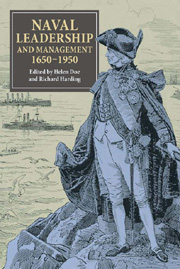Book contents
- Frontmatter
- Contents
- List of Tables
- List of Editors and Contributors
- Acknowledgements
- List of Abbreviations
- Michael Duffy: An Appreciation
- Introduction
- Leadership: The Place of the Hero
- Leadership and Organisational Frictions: Contested Territories
- Management Capability and the Exercise of Naval Power
- 5 High Exertions and Difficult Cases: The Work of the Transport Agent at Portsmouth and Southampton, 1795–1797
- 6 Forgotten or Ignored, the Officers at Invergordon:‘We are doing this for you as well you know’
- 7 ‘To Excite the Whole Company to Courage and Bravery’: The Incentivisation of British Privateering Crews, 1702–1815
- The Evolution of Management Training in the Royal Navy, 1800–1950
- Select Bibliography
- Index
5 - High Exertions and Difficult Cases: The Work of the Transport Agent at Portsmouth and Southampton, 1795–1797
from Management Capability and the Exercise of Naval Power
Published online by Cambridge University Press: 05 February 2013
- Frontmatter
- Contents
- List of Tables
- List of Editors and Contributors
- Acknowledgements
- List of Abbreviations
- Michael Duffy: An Appreciation
- Introduction
- Leadership: The Place of the Hero
- Leadership and Organisational Frictions: Contested Territories
- Management Capability and the Exercise of Naval Power
- 5 High Exertions and Difficult Cases: The Work of the Transport Agent at Portsmouth and Southampton, 1795–1797
- 6 Forgotten or Ignored, the Officers at Invergordon:‘We are doing this for you as well you know’
- 7 ‘To Excite the Whole Company to Courage and Bravery’: The Incentivisation of British Privateering Crews, 1702–1815
- The Evolution of Management Training in the Royal Navy, 1800–1950
- Select Bibliography
- Index
Summary
In 1987 the Clarendon Press published Michael Duffy's book, Soldiers, Sugar and Sea Power. The British Expeditions to the West Indies and the War Against Revolutionary France. The book revealed the achievements and the tragedy of Britain's ‘blue water’ policy in the French Revolutionary War. This paper aims to complement his book by revealing some of the administrative efforts that facilitated the expeditions. Its principal source is a copybook of letters received by Captain Daniel Woodriff, agent for transports at Portsmouth and Southampton from 1795 to 1797. His work is here placed in its broader context, which indicates how the British state developed to project its power by sea, and how that capability stemmed from the heart of the state's central bureaucracy.
Historiographically, with regard to the transport service of Great Britain, we live in the wake of David Syrett's work on the American War of Independence, the Seven Years War and War of Austrian Succession. David emphasised the problems of competition between the naval boards, the Treasury and Ordnance departments for the hire of ships, their different procedures which meant owners could pick and choose the terms that most suited them, and the shortages of transports that developed. He especially accentuated the views of Sir Charles Middleton who, as Comptroller of the Navy Board, was responsible for the hire and equipment of troop transports for the Treasury and took over the supply and despatch of army victuallers.
- Type
- Chapter
- Information
- Naval Leadership and Management, 1650–1950 , pp. 95 - 108Publisher: Boydell & BrewerPrint publication year: 2012



